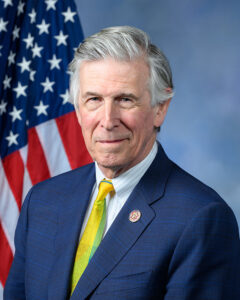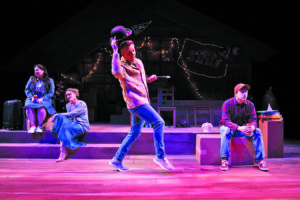
Former Virginia State Del. James Martin Scott died suddenly last weekend at the Aarondale Retirement and Assisted Living Community in Springfield, Va, of complications from Alzheimer’s disease. Scott was 78.
Memorial service details remained undetermined at the time of publication, although the date is believed to be Sunday, May 7.
Scott served the 53rd District of Virginia that includes the City of Falls Church, for 22 years from 1991 to 2013. He won his first election to that post by a single vote, earning him the nickname, “Landslide Jim.”
A staunch progressive, he crafted his liberal perspective as an activist at the University of North Carolina during the Civil Rights struggles.
Graduating from UNC in 1960 and with a masters from George Mason University three years later, he was a high school teacher and housing advocate before first running for public office in 1972. He served 12 years on the Fairfax County Board of Supervisors from 1972-1984, and then worked at the Inova Health Systems before running for delegate in 1991.
Upon his retirement in January 2014, Scott’s last public appearance was at his annual Labor Day barbecue at his home in Vienna in 2016.
Scott is survived by his wife Nancy and two children, Casey and Mary Alice.
Tributes to Del. Scott have been pouring in. Del. Simon opened his remarks at the legislative report luncheon of the Falls Church Chamber of Commerce and the Merrifield Business Association this Tuesday with a tribute to Scott, saying how taking a job with him as a legislative assistant in 1992 changed his cynical attitudes toward persons in public office.
Scott, he said, was a true servant of the people, and not in it for the ego, the power or corruption.
Del. Simon devoted his periodic column in the News-Press in this edition to recollections of Scott, calling him “a man of amazing character…in politics for all the right reasons.”
“Jim’s greatest asset was his ability to learn and understand new information, apply it to what he already knew from his experience working on housing issues in Fairfax, and navigate the process so that everyone came out feeling like a winner,” Simon wrote. He earned “a reputation as someone that everyone wanted to work with.”
“Jim’s compassion made him a champion of the people, a true progressive before his time. His sense of humor made him accessible. He embodied the type of public servant I strive to be,” Simon added. “Good people can do great things. Jim Scott was a great man who did great things for our community.”
The News-Press also dedicated its editorial in this edition to our editor’s thoughts on Scott’s contributions and legacy. Scott had a regular column in the News-Press and granted a lengthy exclusive interview published in the January 8, 2014 edition of the News-Press upon leaving office.
In a statement issued this week by U.S. Rep. Gerry Connolly (a Democrat from the 11th District of Virginia covering much of Scott’s 53rd Assembly District), Scott was characterized as “a quiet, gentle but forceful advocate for all who feel powerless…a voice for civil rights, women’s rights and LGBT rights.”
“Unusual for a politician, Jim was self-effacing,” Connolly’s statement continued. “A natural mentor, he promoted talent and sought to bestow credit on others. He advanced the careers of myriad public officials. His generosity of spirit benefited causes throughout our Virginia commonwealth, and most of that generosity was unheralded. He championed affordable housing, the homeless, the Fairfax Fair, telework, the environment. In so doing he elevated politics and ennobled public service as a calling.”
From his January 2014 article covering his exclusive interview with the News-Press is the following about Scott’s early years:
Born in 1938 in Galax, Virginia, the son of a traveling salesman, Scott moved with his family to Winchester at a young age, and graduated from John Handley High School there, a public high school built and maintained on an endowment from Judge John Handley, who was devoted to childhood education, including through the funding of, in those segregated days, black schools.
Of that school’s Class of 1956, Scott was persuaded by a high school friend planning to attend the University of North Carolina on an athletic scholarship. Surviving members of that Class of ‘56 enjoy reunions every year, and Scott never misses one, he said in an interview with the News-Press at the downtown Falls Church Panera Bread last month.
At UNC, the pro-civil liberties legacy of its former president Frank Porter Graham, its president from 1930 to 1949, was still fresh. Graham had been appointed to fill an unexpired term as a U.S. Senator in 1949, and when he ran for a full term the next year, he was upended in the Democratic primary by a candidate who enjoyed the fervent support of the future Senator Jesse Helms.
But in his one year as a senator, Graham recruited young reform-minded aides, and that included fresh UNC graduate Lowenstein. During the 1950s, Lowenstein’s activism in the state succeeded the expired term of his boss, including as an instructor at North Carolina State.
While at UNC from 1956 until his graduation in 1960, Jim Scott fell under Lowenstein’s magnetic influence. “He was the smartest man I’d ever met,” Scott told the News-Press. Scott got involved in campus politics and became a member of the student governing council.
He followed graduation by enrolling at George Mason University for a masters degrees in education, which he completed in 1963 after a year in Panama studying under the Smith-Mundt program. He then returned to Winchester to teach high school English in the fall of 1963.
But in Winchester, he quickly got involved with community anti-poverty programs, and went to work for the Sargent Shriver’s “War on Poverty,” set up under President Johnson in 1964.
“It was an eye-opening experience,” he said, “to see how completely segregated everything was. It was hard to deal with.”
When that program ended, Scott moved to North Arlington to focus on issues of disadvantaged women and to push for passage of the Equal Rights Amendment. In 1971, the opportunity to run for the Providence District seat on the Fairfax County Board of Supervisors presented itself, and Scott upset the incumbent, the beginning of a 14-year career in that office.
In 1972, he met his future wife, Nancy Cromwell, at a presidential campaign rally for the “unbossed and unbought” Rep. Shirley Chisholm, and they subsequently married and had two children, Casey and Mary Alice.













